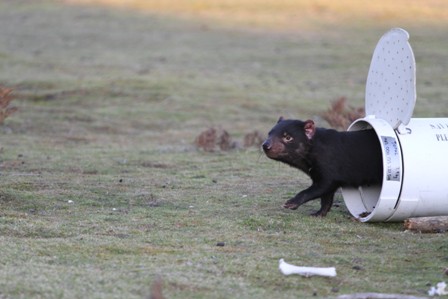World first as trial of Tasmanian Devil vaccine begins in wild

World first as trial of Tasmanian Devil vaccine begins in wild
The release of 19 immunised devils into Narawntapu National Park marks an important point in the quest to save the Tasmanian devil from extinction - it is the first time a vaccine against the deadly cancer threatening the species has been tested in the wild.
The release of 19 immunised devils into Narawntapu National Park marks an important point in the quest to save the Tasmanian devil from extinction - it is the first time a vaccine against the deadly cancer threatening the species has been tested in the wild.
Previous trials of the vaccine have taken place in the laboratory at the Menzies Institute for Medical Research at the University of Tasmania, where the devil research team led by immunologist Professor Greg Woods has been able to activate an immune response against cancer cells.
Professor Woods said that, of the 19 devils to be released, 18 had produced an immune response to the vaccine. "This is an excellent outcome, but the real test will be determining whether the vaccine is effective in protecting devils in the wild, hence the release at Narawntapu," he said.
Professor Woods said the 19 devils would be monitored after their release and regular blood samples would be collected to confirm that the immune response was still active. If not, the devils may require a booster.
Menzies is working in partnership with the Save Tasmanian Devil Program, as well as national and international scientific collaborators, to help achieve the Tasmanian devil's long term survival in the wild.
Menzies and the University's School of Medicine have developed the immunisation technique in association with Dr Martin Pearse, Dr Adriana Baz Morelli and Ms Anabel Silva from CSL Limited. Adjuvant (substances to promote vaccine efficacy), vaccine expertise and financial support has been provided by CSL Limited as part of efforts to support the research community in Australia.
Immunologist Associate Professor Lynn Corcoran and protein chemist Dr James Murphy, both from the Walter and Eliza Hall Institute of Medical Research in Melbourne, have assisted in the project by developing tools to measure immune (or antibody) responses and natural devil proteins that stimulate DTFD cells to "reveal" themselves to the devil's immune system.
Professor Woods said the support of the Australian Research Council and the Save the Tasmanian Devil Appeal (www.tassiedevil.com.au) was critical for their ongoing work.
"Public donations and corporate support received by the Devil Appeal reached an all-time high in 2014, with over half a million dollars raised, allowing the Appeal to fund some of the outstanding success we have witnessed in the past few years," he said.
Apart from the Walter and Eliza Hall Institute for Medical Research and CSL Limited, the University of Tasmania is collaborating with the University of Sydney, the University of Cambridge and the University of Southampton.
For media queries relating to DFTD vaccine development and immunisation research at the Menzies Institute for Medical Research contact:
Miranda Harman
M: 0427 199 562
For media queries relating to the Save the Tasmanian Devil Program contact:
Michelle Nichols
M: 0427 410403
E: michelle.nichols@environment.tas.gov.au
Photo: One of 19 vaccinated Tasmanian Devils released into Narawntapu National Park in northern Tasmania. Photo courtesy Simon de Salis, Save the Tasmanian Devil Program.
Contact:
Phone:
Email: